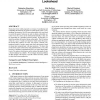Free Online Productivity Tools
i2Speak
i2Symbol
i2OCR
iTex2Img
iWeb2Print
iWeb2Shot
i2Type
iPdf2Split
iPdf2Merge
i2Bopomofo
i2Arabic
i2Style
i2Image
i2PDF
iLatex2Rtf
Sci2ools
ATAL
2015
Springer
2015
Springer
Practical Run-Time Norm Enforcement with Bounded Lookahead
Norms have been widely proposed as a means of coordinating and controlling the behaviour of agents in a multi-agent system. A key challenge in normative MAS is norm enforcement: how and when to restrict the agents’ behaviour in order to obtain a desirable outcome? Even if a norm can be enforced theoretically, it may not be enforceable in a grounded, practical setting. In this paper we study the problem of practical norm enforcement. The key notion is that of a guard. Guards are functions which restrict the possible actions after a history of events. We propose a formal, computational model of norms, guards and norm enforcement, based on linear-time temporal logic with past operators. We show that not all norms can be enforced by such guard functions, even in the presence of unlimited computational power to reason about future events. We analyse which norms can be enforced by guards if only a fixed lookahead is available. We investigate decision problems for this question with respe...
| Added | 16 Apr 2016 |
| Updated | 16 Apr 2016 |
| Type | Journal |
| Year | 2015 |
| Where | ATAL |
| Authors | Natasha Alechina, Nils Bulling, Mehdi Dastani, Brian Logan |
Comments (0)

